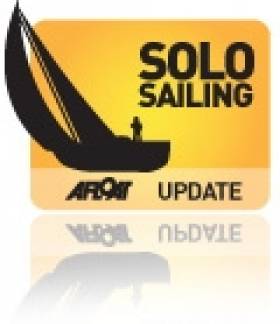Displaying items by tag: AZAB
Dun Laoghaire's Conor Corson Wins 2,400 Mile AZAB Ocean Race
Irish sailor Conor Corson sailing doublehanded with Elin Jones, has won the AZAB Ocean race overall in his Sunfast 3300, Asgard.
The AZAB is a 2,400-mile ocean race starting in Falmouth and going to the port of Ponta Delgada on the Azores Island off São Miguel. Leg two returns to Falmouth.
Corson, a former ISORA competitor, and Jones won both legs in Class Two and held the best aggregate score over both legs too.
A punchy-looking weather system saw them sail downwind the whole way to the Azores in a good strong northeasterly.
The race destination, Ponta Delgada, is the capital of São Miguel, one of nine Azores Archipelago Islands in the Eastern Atlantic, approximately 750 nautical miles off the coast of Portugal and some 1,220 miles from Falmouth.
In a stunning performance, the pair completed the 1,200-mile second leg home to Falmouth in five days and 18 mins (corrected time).
Corson, an overseas member of the National Yacht Club and the Irish National Sailing School /INSS), is now a full-time marine professional based in Southampton, specialising as a rigger and delivery skipper.
Corson is already on to his next regatta, telling friends on social media: "Quick pitstop in Falmouth to have a beer, sleep and resupply, then it's a quick turn and burn for La Trinite to compete in the IRC Double-handed Europeans".
The overall results are here
Welsh ISORA Duo Take on AZAB Race Challenge
ISORA regulars and Pwllheli Sailing Club Commodore Mark Thompson sailing with Phil Jackson, compete in the AZAB race this Saturday.
The pair are sailing Jac Y Do, a Jeanneau Sun Fast 3200, in Class 3.
" We are now all prepared and ready for the start, the category 1 offshore inspection was very stringent and took a lot of preparation, but now completed. We are in good shape and looking forward to our adventure, " Thom,pson said before the off.
There are five AZAB classes and a total of 50 entries in the 2023 race.
 Mark Thompson sailing with Phil Jackson (holding a bottle of Jack Ryan Whiskey)
Mark Thompson sailing with Phil Jackson (holding a bottle of Jack Ryan Whiskey)
The AZAB is a 2,400-mile ocean regatta starting in Falmouth and going to the port of Ponta Delgada, on the Azores Island off São Miguel. Leg two returns to Falmouth.
Competitors have time on the island for some R&R before racing back to Falmouth.
The race destination, Ponta Delgada, is the capital of São Miguel, one of nine Azores Archipelago Islands in the Eastern Atlantic, approximately 750 nautical miles off the coast of Portugal and some 1220 miles from Falmouth.
“Most yachts participating in the race take between 7 and 10 days to reach the Azores, allowing a week or so to relax and prepare for the return passage,” Thomson said.
Solo Sailing Conference Offers Charter of Performance Yachts
Irish solo sailing fans may be interested in the annual Solo Racing Festival at the Royal Southern Yacht Club, Hamble on Saturday 12th March.
Given the Figaro race is coming to Dun Laoghaire in August a talk on the Artemis Academy with John Thorn (Figaro 2) will be of particular interest.
Owen Clarke's designer Merfyn Owen, who lives in Hamble will be attending as well as colleagues from their brokerage partners Boatshed Performance.
So whether your interest be solo sailing or short-handed sailing in general they will be there to answer questions on design, construction, as well as sale/purchase and charter of offshore performance yachts.
The Race Fair is an open house from 10.00 for race organisers to meet and greet potential skippers from; Global Ocean/Class 40, Mocra, UK mini group, RORC, SORC, Biscay Challenge, AZAB. Floating boat show, 8 boats including the OC class 40, 2 minis, A35, J105, Figaro 2, Sunfast 3200.
There is a Book Signing, Alex Bennett signing copies of High Seas High Stakes and showing Fuji DVD Mike Golding is opening the talks at 11,00.
Followed by:
Winning Mind Set with Ian Brown, sports psychologist
Global Ocean race with Oliver Dewar
Two Star/Ostar with John Lewis, RWYC
30m trimaran design with Nigel Irens (Idec, Sodebo)
Artemis Academy first term report with John Thorn (Figaro 2)
Route du Rhum with Marco Nannini, (class 40)
all in the spendid riverside setting of the Royal Southern Yacht Club, Hamble.
More HERE.





























































